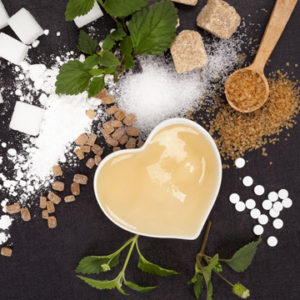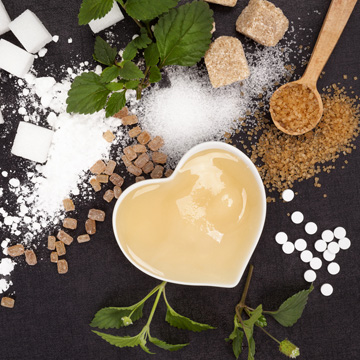 Serving patients of Erwin, Jonesborough, and Greeneville TN
Serving patients of Erwin, Jonesborough, and Greeneville TN
It’s no secret that too much of anything isn’t ideal, especially with sugar. Too much sugar increases the risk of obesity, diabetes, heart disease, and other serious health ailments. Not to mention, sugar can destroy your oral health. Artificial sweeteners have been available for years, with newer, better-tasting varieties like Splenda and Stevia found in more products now than ever before. Does the prevalence of these ingredients mean they are better for your teeth than sugar? Let’s find out on the blog today.
Sugar is labeled as one of the worst foods for your body and your teeth, although processed carbohydrates like bread and crackers are more likely to cause cavities than sugar. Processed carbs break down into sugar, which fuels cavity-causing bacteria that can produce acids for up to 20 minutes after consuming your snack. It’s the acids, not sugar, that cause cavities, although oral bacteria also thrive off sugar as well, converting it into acids that erode dental enamel. So, while sugar itself doesn’t cause cavities, it’s the by-product of sugar, the acids, that cause decay. One way to lower your risk of cavities is to limit your sugar consumption or eat it in one sitting rather than snacking on it throughout the day. Even seemingly healthy foods like dried fruit stuck to your teeth fuels oral bacteria that secret enamel eroding acids. Give your teeth a break and allow them to re-mineralize before your next meal.
Artificial sweeteners are considered a “healthier” alternative to sugar because they are usually low in calories or calorie-free. While artificial sweeteners aren’t the healthiest food option, they don’t cause bacteria to produce enamel-eroding acids like sugar. Additionally, varieties of sugar alcohol like Xylitol that often are combined with artificial sweeteners actually help reduce the risk of cavities, although it should not be used as a substitute for good oral hygiene. Sugar-free chewing gum often contains Xylitol and is proven to kill oral bacteria that lead to tooth decay. While artificial sweeteners may be a safer alternative for your teeth, consume them sparingly because they have been linked to other health problems like obesity and diabetes.
As with any food, consume artificial sweeteners in moderation to benefit your dental and overall health. Additionally, our family dentist in Greeneville recommends practicing good oral hygiene by brushing your teeth twice a day and flossing daily. It’s also recommended to see the dentist twice a year for checkups and cleanings. At these appointments, tartar buildup is removed from your teeth, which can help lessen your risk of cavities and gum disease when paired with a good at-home oral hygiene routine and a healthy diet.
Family Dentists in Greeneville, and Erwin, Tennessee
At Tusculum Dental Care, we believe that all smiles are unique. We invite you to schedule a checkup and cleaning appointment, especially if it has been more than six months since your last visit to a dentist. We will check for any dental health problems that can be addressed during this appointment before they worsen. To learn more about managing your oral health or schedule a visit, please call Tusculum Dental Care at (423) 639-7575 or contact us on our website today.

